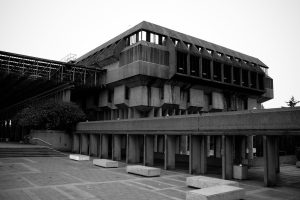President Johnson focuses on inclusion and academic prioritization
Mar 22, 2019
President Michael Johnson revealed plans of reevaluating the Diversity, Equity and Inclusion office and the allocation of resources within academic departments to the newly renamed John Carroll Student Government.
Johnson sat among student senators at a crowded roundtable meeting on Tuesday, Feb. 19. After observing the formal governmental proceedings of opening the meeting and voting on the name change, Johnson spoke on the strides John Carroll is taking as a University.
During the week of Feb. 12, the Higher Learning Commission conducted an accreditation process that, according to Johnson, “couldn’t have gone better.” The accreditation process ensures that universities maintain certain standards, whether those standards be in financial security, policy, or diversity, equity and inclusion.
Reputable universities are accredited. The process validates an institution’s quality and allows employers to trust the education of job candidates. Johnson recognizes the importance of accreditation, stating confidently that, “[The accreditation committee] literally said they want this to be a watershed moment in the perception of HLC at John Carroll University.”
Involved in every accreditation review, according to Johnson, are critiques or “something you need to work on.”
During the previous evaluation, the HLC recommended instituting a total quality management system that would address academic programming and redressing the University’s financial portrait, “which has categorically improved,” according to Johnson.
The HLC pushed John Carroll to formulate three major stages of academic planning. The first began two and a half years ago when the University registered savings from restructuring and the faculty retirement program.
“That improved our balance sheet performance categorically … We went up in our bond rating from a negative to a neutral position. We have a plan in place to get our GAP budget – our university budget – with $9 million in capital depreciation, now loaded onto the budget. So we take care of our buildings, we take care of the vehicles that students use on their trips, all of our infrastructure is now loaded on. We plan on being positive by 2022 on that budget. This is a huge thing for the University,” said Johnson.
Since addressing the financial crisis John Carroll faced, the HLC has suggested revamping the Diversity, Equity and Inclusion program, a suggestion Johnson is going to great lengths to satisfy.
Created by Ed Peck, and formed with the assistance of the Diversity, Equity and Inclusion Committee, the University’s inclusion strategy will allocate funds to a new office of Diversity, Equity and Inclusion. “It will be some significant funding,” Johnson stated, “probably at least $200,000 a year or more for a three year period, that we can commit to the diversity and inclusion reorganization and hiring a high level person who will report directly to me.”
The new office, which will be implemented over the summer, will feature “some programming funds and adding at least two FDEs,” according to Johnson. Separate from Title IX, the sole job of the staff will be to ensure that John Carroll is a safe and welcoming place for all people, regardless of sexual orientation, race or gender.
This comes after Carroll News columnist Declan Leary wrote a controversial column in the fall of 2018 calling out the JCU drag show for being inconsistent with Catholic values.
Johnson alluded to this when detailing his conversation with the Allies group, a conversation that aided Johnson in the construction of the University’s inclusion goals. “This is about differences in views … between some of our Catholic doctrine, our Catholic teachings, and the views of our LGBTQ community. There’s a tension there. So we talked a lot about that. It’s not about whose truth is right or wrong. It’s about trying to understand the other person’s truth and where they’re coming from.”
Johnson continued to explain the absence of a comment from the University, citing the “Ignatian conversation approach” as his method of interacting with communal tension.
“The Ignatian Conversation Approach is kind of a simple five-step process that we should all use whenever we’re in a tense situation. The first step is to be very slow to speak. The second step is to listen carefully. The third step is to find the truth in what others are saying. The fourth step is to disagree respectfully. The fifth step is to give the conversation the time it needs. The hard part is often the third step,” said Johnson.
Johnson underscored the importance of listening to the voices of students, all students, as a key tenant in the Ignatian conversation approach. “I want to meet with [students] to continue this discussion so that we can talk about programatcially what we want this new office to be. It’s taking a few offices on campus, it’s putting them together. It also involves taking a team approach, at the senior leadership level,” said Johnson.
In addition to centering efforts on the Diversity, Equity and Inclusion front, Johnson aims to critically evaluate academic programming, a process that will enable selective investment in healthier programs.
“There may be a small number of programs that we either have to find out how they can work differently, be executed differently, work at a different scale, to be able to invest in the programs that are growing,” said Johnson.
Johnson continued, “Forty percent of colleges and universities today are going through this exact stage, [asking] where do we take some resources from weaker programs to support stronger programs?”
Through prioritization, Johnson believes that John Carroll will be revitalized and more effectively serve the student body.
Maintaining his theme of dialogue, Johnson often referenced members of the John Carroll Student Government during his presentation. They responded candidly, adding their voices to the discussion of John Carroll’s future.












